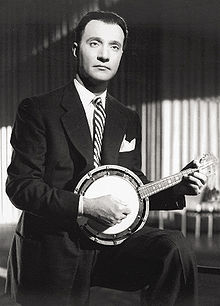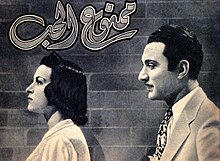Mohammed Abdel Wahab
This article may be written from a fan's point of view, rather than a neutral point of view. (April 2023) |
Mohammed Abdel Wahab | |
|---|---|
 Mehammad Abdelwahab with a mandolin | |
| Background information | |
| Born | March 13, 1898 Cairo, Khedivate of Egypt |
| Origin | Egypt |
| Died | May 4, 1991 (aged 93) Cairo, Egypt |
| Genres | Egyptian music |
| Occupations |
|
| Instruments |
|
| Years active | 1917–1991 |
| Labels | Mazzika |
| Website | www |
Mohamed Abdel Wahab (Egyptian Arabic: محمد عبد الوهاب), also transliterated Mehammad Abdelwehab, Egyptian Arabic pronunciation: [mæˈħam.mæd ʕæbd el wæhæːb] (March 13, 1902 – May 4, 1991), was a prominent 20th-century Egyptian singer, actor, and composer. He is best known for his Romantic and Egyptian patriotic songs.
He was known for his Egyptian nationalist and revolutionary songs like "Ya Masr Tamm Elhana" (O Egypt, happiness is here), "Hayy Ala Elfalah" (The call of duty), "Elwatan Elakbar" (The Greatest Homeland), "Masr Nadetna fa labbena Elnedaa" (Egypt Called us and we Have Answered), "Ulo le Masr" (Tell Egypt), "Hobb Elwatan Fard Alayya" (Patriotism is my Obligation), "Sot Elgamahir" (Voice of the Masses), "Ya Nesmet Elhorriyya" (O The Breeze of Freedom), "Sawa'ed men Beladi" (Arms from My Country).
He also composed the national anthem of Libya which was adopted from 1951 to 1969 and again since 2011.[1][2]
Life
[edit]Mohamed Abdel Wahab was born in 1898 in Cairo, Egypt,[3] in a neighborhood called Bab El-Sheriyah, where there is now a statue of him. He began his singing career at an early age and made his first public performances at age seven at local productions. He was 13 when he made his first recording. Mohamed Abdel Wahab was a very close friend to compatriot singer Abdel Halim Hafez.
Film career
[edit]
In 1933, Abdel Wahab began composing his own style of Egyptian film musical after visiting Paris and familiarizing himself with French musical film.[4] He introduced a lighthearted genre of musical film to Egyptian culture eventually composing eight musical comedies between 1933 and 1949. His films portrayed Western social elite and included music that veered off from the traditional Egyptian tune. He starred in his 1933 film The White Rose which broke records in attendance and still plays frequently in Egyptian theaters. In 1950 Abdel Wahab left film to focus on being a more profound singer.
Contribution to Egyptian and Arabic music
[edit]Abdel Wahab composed more than 1820 songs.[4] Abdel Wahab is considered to be one of the most innovative Egyptian musicians of all time, laying the foundation for a new era of Egyptian music with his use of non-local rhythms and refined oud playing.
Despite the fact that Abdel Wahab composed many songs and musical pieces of classical Arabic music, he was notably criticized for his orientation to Western music. In fact, he introduced Western rhythms to Egyptian songs in a way appropriate to the known then very classical forms of Egyptian songs. For example, in 1941, he introduced a waltz rhythm in his song "El Gandol," and, in 1957, he introduced a rock and roll rhythm in Abdel Halim Hafez's song "Ya Albi Ya Khali". In 1950s, he also produced a infamous Palestinian nationalist song, "Akhi Jawiz Alzaalimun Almadaa" (Brothers, the oppresors has gone to far).
He composed some of the best hits of Nagat El Saghira, including four poems by Nizar Qabbani.
Abdel Wahab played oud before the prominent Egyptian poet, Ahmed Shawqi, and acted in several movies. He composed ten songs for Umm Kulthum. He was the first Egyptian singer to move from silent-era acting to singing.[5]
Abdel Wahab also composed songs for the Lebanese icon Fairuz[6] whom he famously called "Our Ambassador to the Stars"[7] and stated in 1958 that he was the leader of her fan club in Cairo.[8]
Death
[edit]Mohamed Abdel Wahab died in his hometown Cairo, Egypt of a stroke on May 4, 1991.[3]
Legacy
[edit]Abdel Wahab was fundamental in establishing a new era of Egyptian music in his homeland and across the Arab world. He also left a mark on the Western world by exposing Egyptian music to Western classical and popular traditions.
He composed Libya, Libya, Libya, the Libyan national anthems.[2]
Tribute
[edit]On March 13, 2012, Google celebrated his 110th birthday with a Google Doodle.[9]
Filmography
[edit]- As actor
- The White Rose (1933)
- Doumou' el Hub (Love's Tears) (1936)
- Yahya el Hub (Long Live Love) (1938)
- Yawm Sa'id (Happy Day) (1939)
- Mamnou'a el Hub (Love Is Forbidden) (1942)
- Rossassa Fel Qalb (A Bullet in the Heart) (1944)
- Lastu Mallakan (I'm No Angel) (1947)
- Ghazal Al Banat (The Flirtation of Girls) (1949)
Honours
[edit]Egyptian national honours
[edit]| Ribbon bar | Honour |
|---|---|
| Grand Cordon of the Order of the Nile | |
| Commander of the Order of the Arab Republic of Egypt | |
| Grand Cross of the Order of Merit (Egypt) |
Foreign honors
[edit]| Ribbon bar | Country | Honour |
|---|---|---|
| Grand Cordon of the Supreme Order of the Renaissance | ||
| Commander of the National Order of the Cedar | ||
| Collar of the National Order of Libya | ||
| Grand Cross of the Order of Ouissam Alaouite | ||
| First Class of the Order of Oman | ||
| Grand Cordon of Order of Civil Merit of the Syrian Arab Republic | ||
| Grand Cordon of the Order of the Republic of Tunisia |
References
[edit]- ^ About Libya: Libyan National Anthem, National Transitional Council of Libya, archived from the original on July 21, 2011, retrieved August 23, 2011
- ^ a b "Egyptian artists contribute in 6 Arab national anthems". egypttoday.com. June 9, 2017.
- ^ a b "Abdel Wahab: The immortal generations musician". egypttoday.com. May 4, 2019. Retrieved May 4, 2019.
- ^ a b "Mohammad Abdel Wahab". Al Mashriq. Retrieved July 16, 2016.
- ^ Best Arabic Music Archived February 3, 2016, at the Wayback Machine. Best Arabic Music. Retrieved March 13, 2012.
- ^ "Songs of Wahab Mohamed Abdel - Fairuz | Songs, Reviews, Credits". AllMusic. Retrieved November 24, 2021.
- ^ "Lebanese diva arouses emotion, controversy in Syria". Reuters.com. January 28, 2008. Retrieved November 24, 2021.
- ^ "Beirut and Fairouz: A path of gold and loss - Heritage special - Heritage". English.ahram.org.eg. Retrieved November 24, 2021.
- ^ "Mohammed Abdel Wahab's 110th Birthday". Google. March 13, 2012.
External links
[edit]Selected Mohammed 'Abd al-Wahhab compositions from YouTube Web site:
- 1901 births
- 1991 deaths
- Egyptian composers
- Egyptian male composers
- 20th-century Egyptian male singers
- Egyptian nationalists
- Musicians from Cairo
- Singers from Cairo
- Egyptian oud players
- EMI Classics and Virgin Classics artists
- 20th-century composers
- Egyptian male film actors
- National anthem writers
- Singers who perform in Egyptian Arabic
- Arabic-language singers of Egypt
